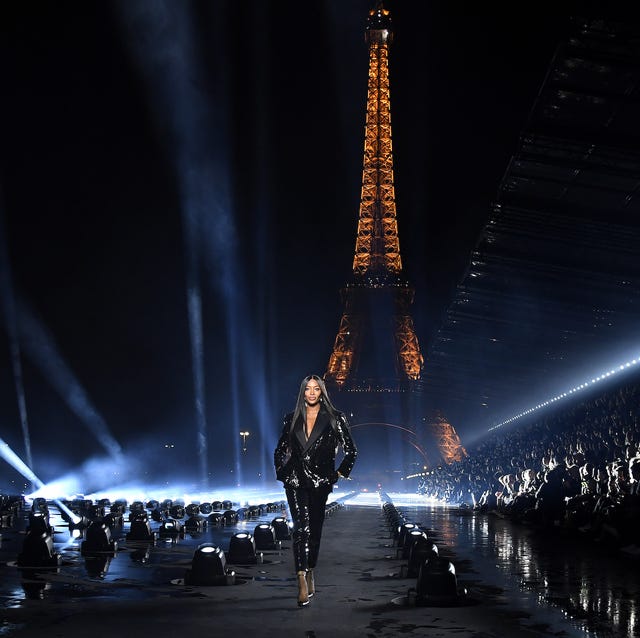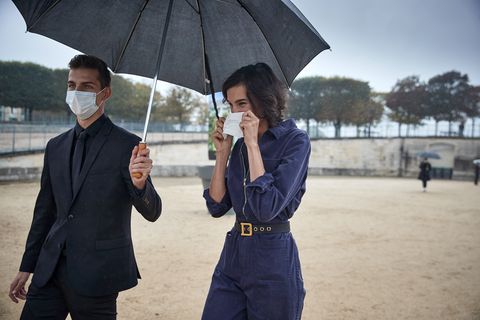Without guests, French houses face the same headwinds they did with the onset of the virus nearly a year ago– engagement. Paris Fashion Week’s greatest asset is perhaps what happens on the peripheral, off the fringes of the runway itself, the in between moments that allow all ends of the industry to collide at once and then resurface on social media for the world to see. Slated from January 19 to 24, designers are again looking to reinterpret tradition and honor house codes all while conveying a narrative in the digital multiverse.
Brands like Dior and Louis Vuitton had visions of resurrecting the physical show after a year of snubbing them for “phygital” interpretations. Now, according to the federation’s Executive Vice President Pascal Morand, any physical interpretation of their collections has been relegated to live stream/pre-recorded renditions, airing on the federation’s online hub, created in partnership with data research and insights company, Launchmetrics.

But within the internal scape of fashion, Paris Fashion Week can seem an occult observance, one that nearly shoulders all the traditional heft of the industry, and defines the modus and edge of creative directors all within their fleeting reign. In fashion’s capital city, is a digital shift sufficient a second time around?
“We’re now at the height of the digital revolution, which has only been accelerated by the COVID-19 crisis,” said Morand. “The digitization of Fashion Week will never replace in-person events but it will largely enrich and amplify creative expression and communication.”
A push towards the virtual realm allows designers the unique opportunity to translate more than their sartorial acumen to the public. Launchmetric’s platform will allow access to editorial content: interviews, behind-the-scenes reels, and curated commentary from media pundits, maisons, organizations and cultural foundations, alongside brand videos and seasonal images; industry insiders will be able to tap into new resources, putting press rooms and the showroom modus online.

As the pandemic continues to restructure any outlying silos of the fashion industry, it’s essential the luxury standard translates digitally. For high-priced investments, three-dimensional visuals are near necessary to ensure quality and justify purchases.
While the suspense of PFW’s return is tabled for the time being, Paris is still on the heels of a creative shift for three major houses. The catwalks at Chloe, Givenchy, and Fendi will pivot under the painterly eyes of new creative directors assuming their roles, suspending us in anticipation for their debut. Kim Jones succeeding the late Karl Lagerfeld, plans to show at the Palais Brongniart for his artistic unveiling of Fendi; he remains artistic director of Dior Men. Elsewhere, Gabriela Hearst assumes the past role of Natacha Ramsay-Levi as Chloe’s creative director, while maintaining her eponymous, NY-based line, and Matthew Williams emerges in Clare Waight Keller’s footsteps at the creative helm of Givenchy’s storied heritage.
Without pause, this season’s shows will surely attempt to blur the line between digital and physical, just with parred back decadence, insularity, and sacrosanctity. All told, in absence of a runway, everything may become a bit more formulaic, less of a luxury play, less spectacle, perhaps even more business-as-usual.
A push towards the virtual realm allows designers the unique opportunity to translate more than their sartorial acumen to the public. Launchmetric’s platform will allow access to editorial content: interviews, behind-the-scenes reels, and curated commentary from media pundits, maisons, organizations and cultural foundations, alongside brand videos and seasonal images; industry insiders will be able to tap into new resources, putting press rooms and the showroom modus online.

While the suspense of PFW’s return is tabled for the time being, Paris is still on the heels of a creative shift for three major houses. The catwalks at Chloe, Givenchy, and Fendi will pivot under the painterly eyes of new creative directors assuming their roles, suspending us in anticipation for their debut. Kim Jones succeeding the late Karl Lagerfeld, plans to show at the Palais Brongniart for his artistic unveiling of Fendi; he remains artistic director of Dior Men. Elsewhere, Gabriela Hearst assumes the past role of Natacha Ramsay-Levi as Chloe’s creative director, while maintaining her eponymous, NY-based line, and Matthew Williams emerges in Clare Waight Keller’s footsteps at the creative helm of Givenchy’s storied heritage.
Without pause, this season’s shows will surely attempt to blur the line between digital and physical, just with parred back decadence, insularity, and sacrosanctity. All told, in absence of a runway, everything may become a bit more formulaic, less of a luxury play, less spectacle, perhaps even more business-as-usual.

No comments:
Post a Comment